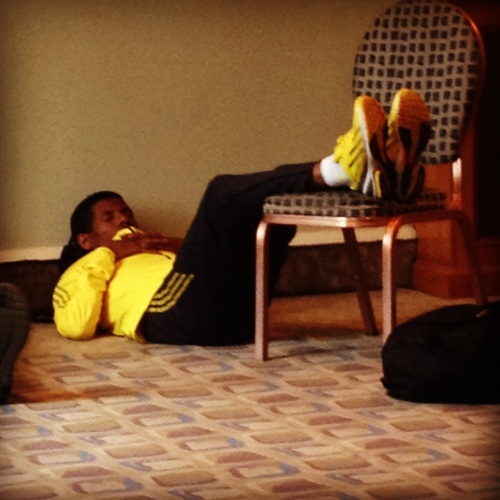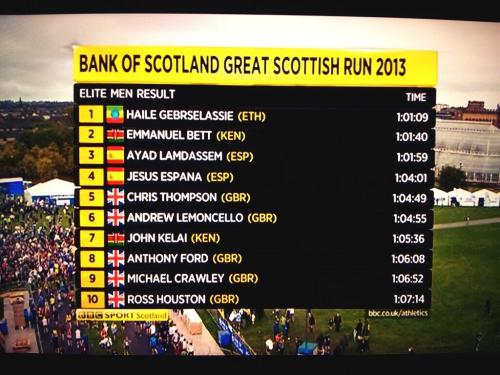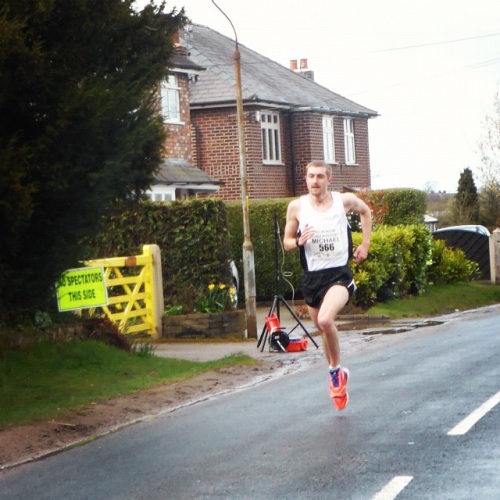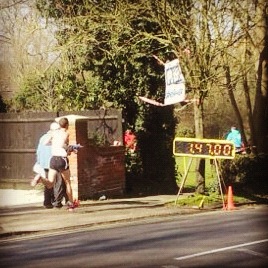A conference room in the Millennium hotel in Glasgow’s George Square. Some faces familiar because of their fame, others, reassuringly, because I know them from the local scene. The latter look how I feel; slightly out of place in this company, like they’re almost certain they’ve wandered into the wrong room. Nervous chatter of the kind you hear before any race, any where. Everyone insuring everyone else knows that they’ve had a cold, a niggle, an interrupted build-up to the race. And then Haile walks in, back arched slightly, chest out. His straight-legged walk is proud, heron-like. The Emperor is here. Silence descends.
Haile’s smile contrasts with the tension in the faces around him. Everyone else stretches, some using long elastic bands to loosen early-morning hamstrings, or paces around, or fiddles with safety pins. Haile goes to sleep. He carefully places a chair just the right distance from the wall, raises his legs on it, and has the twenty minute snooze of a man pleased with his morning of gardening: hands crossed on his chest, a look of contentment on his face. After twenty years at the top of his sport, he can afford to relax. The room remains respectfully quiet until he gets up, gives everyone a smile, and heads out to warm up. This is the cue for everyone else to head out for a jog, too. If it’s time for Haile, it must be time.

Haile warms up on his own, stretching out on a loop around the hotel, his pace gradually increasing. He bounces, yellow-clad in Adidas, past morning shoppers and people arriving for the race. Few people recognise him, those that do double-take as he streaks past. Back in the hotel some light stretching and we are led down to the start. The nerves that accumulated in the stuffy hotel room are dissipated by most with a few too many strides. More nervy chatter, but mostly the other top runners are looking inward now, focusing on the thirteen miles of Glaswegian road to come. The start is up St. Vincent street, a gradually rising hill which tapers to a blind summit. We peer up the hill, trying to size it up.
The start line: spectators lean over barriers, TV crew members mill purposefully, myriad beeping from the timing mat. A barrier forty metres from the start creates a pen. The elite athletes form a jumpy herd, moving now for the sake of movement, their warm-ups complete. Haile, meanwhile, arrives at the start line last. He gives a regal wave, does a casual stride. He obliges, first, all those who want to take his photo on the way to the start. He wishes other runners good luck, hoists a child into the air for a father’s iphone. Like a politician, his smile never wavers. Unlike a politician, his smile is genuine, infectious.
We are told that the race is to be delayed by fifteen minutes due to problems on the course. Much muttering, much worrying about putting tracksuit tops back on and jogging to stay warm. Not from Haile. He shrugs, then gets up onto the start podium to do an interview to pass the time. He is completely unconcerned by the delay. Rather than wasting energy jogging he chats for a while then dances. He performs a series of arm-swinging maneuvers to limber up, some hip twisting and he’s ready.
Just over an hour and six minutes later I learn that Haile finished roughly a mile ahead of me, running the fastest half-marathon ever on Scottish soil. Clearly his relaxed approach did him no harm at all. I did manage to scrape onto the results page on the BBC for the first time though, and took a minute and twenty seconds off my best for the half marathon, running 1.06.52, so I was very pleased with my run.

The advice my coach gave me going into the race was simple. ‘I think I’ve said before that you have to think of the marathon as three ten-mile sections,’ he said. ‘The half marathon is the same. You want to think in terms of three five-mile segments. After ten miles it’s probably going to start getting quite hard.’ He also pointed out that in longer races it is normal to go through a bad patch. This is almost as likely to happen after three miles as after nine, and you have to be ready for it psychologically, assured that you will come out of the other side running strongly.
Bearing this in mind, I set off to run at five minutes five seconds per mile, reasoning that I was in shape to run around 66.30. At around five miles I realised I was having to work pretty hard to stay with Anthony Ford and Ross Houston, so I let a bit of a gap develop and tried to stay relaxed. Backing off a bit and running my own pace paid off, as I realised at eight miles that Ross was coming back to me. I focused on running tall, fixing my eyes on the back of his vest to prevent my head from dropping and willing the gap between us to contract.
At ten miles I finally caught him and put in a bit of an effort to go straight past. I managed to build a bit of a gap on him by eleven miles before I started to really feel like I was working. I had a coffee with Charlie Spedding last week, and he said that when it starts to get hard in longer races there is a temptation to disassociate, to try to take your mind off the effort of running hard. He said that he always felt it was better to do the opposite, to really focus on the mechanics of your running, to concentrate on running upright, on maintaining your form and on telling yourself that you are running well and strongly.
By the last mile, I was very aware of blood pounding in my temples, which seemed to be in time with the rhythm banged out by the spectators on the barriers lining the course. I tried to use this beat to increase my turnover, but I don’t think I was really able to pick it up too much. I was relieved to see the line, relieved to break 67 minutes.




